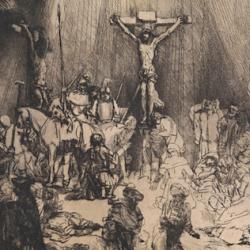In his recent biography of Charles Williams, Grevel Lindop summarizes Williams’s essay on the cross, calling it Williams’s “most powerful and honest theological essay.” Williams observes that the cross is “revolting to our sense of justice,” justifable only because it shows that God entered into our suffering.
He challenges the notion that “evil men” crucified Jesus. As Lindop summarizes: “Caiaphas and Pilate were each of them doing his best in the duty presented to them. The high priest was condemning a blasphemer. The Roman governor was attempting to maintain the peace. At the present time, for example, it is clear that one man must suffer for the people—and many more than one man, whether they consent or not. In other words, innocent people in Germany are being bombed—for the greater good. ‘We can hardly blame those earlier supporters of the same law. Humanly speaking, they were doing the best they could. [. . .] Certainly our sins and faults destroy the good. But our efforts after the good also destroy it.’”
As for the resurrection, Williams was unenthusiastic: “There are those who find it easy to look forward to immortality and those who do not. I admit that, for myself, I do not. It is true that the gradual stupefaction of the faculties which normally overcomes a man as he grows older seems to make—if not the idea of immortality more attractive—at least the idea of annihilation less so. [.. .] But I cannot say I find the idea of immortality, even of a joyous immortality, much more attractive; I admit, of course, that this is a failure of intelligence[.]”
The first point is a powerful one. It doesn’t, Williams seems to know, disprove the evil of those who put Jesus on the cross. Rather, it demonstrates just how pervasive evil is. Even those who are simply doing their jobs, doing the best they can, following reasonable procedures, put the Son of God on the cross. As for Williams’s lack of enthusiasm about resurrection, that is indeed a failure of intelligence, or at least a failure to grasp that the resurrection is not merely a guarantee of immortality. Without the resurrection, Williams couldn’t really make his first point, because it’s the resurrection that exposes the wickedness of those who were “doing their best” and condemning blasphemy and keeping the peace.











